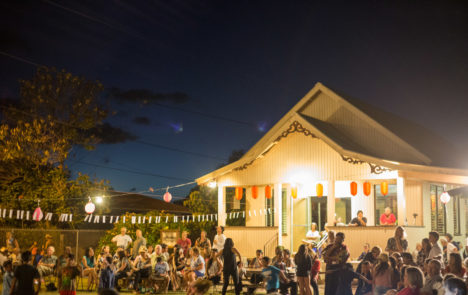Obon Brings Remembrance

Photo by Tyler Westhoff
Community members and visitors alike gathered at the Guzeiji Soto Mission of Molokai last Saturday night to dance, eat, remember and celebrate the festival of Obon. A crowd of about 150 people milled peacefully beneath strings of lanterns and slips of fluttering paper, bearing the names of their loved ones who have passed away.
“It’s important that we take this time, as we say thank you to one another, to a stranger, to our relatives, to our children, to our spouses, we take this moment to also say thank you to our departed loved ones.” said Reverend Shuji Komagata during the evening’s service. “And when we can do that, we are able to truly understand the meaning of Bon and enjoy this time of reunion with our departed loved ones.”
After the Bon service, the Bon Odori began, with dancers and community members joining in traditional dances in a circle around an adorned stage, called a yagura. People of all ages and backgrounds smiled and danced together to spiritual and folk music and later, to the heart-pounding performance of the Somei Taiko drummers of Honolulu.
The festival, while lighthearted and celebratory in mood, is a significant one for many who attend.
“I was born in Japan, so the Bon event is really important for Japanese people,” said Kayo Deschene, “Because especially once a year during Bon three days, we know our ancestor came back on this dimension and we really feel our ancestors’ feelings. So it’s important to remember. It’s a good thing, even when I moved to America, I want to teach how important Obon is for my son.”
The Bon dance is the largest event of the year for the Guzeiji Soto Mission of Molokai. According to organizer Marge Bento, this year’s Bon feels particularly poignant.
“My perspective,with the way the world is now, having peace and family-oriented time, and saying thank you and showing good gesture, I think it’s more important,” she said.
The celebration of Obon dates back at least 500 years in Japanese culture, and today it is widely celebrated throughout the world, most often at Buddhist temples or shrines. Though the celebration varies from region to region, most end with a ritual burning of the slips of paper bearing the names of departed loved ones, known as Okuribi. This ceremony marks the end of Obon, when the spirits of the ancestors are sent back to their dwelling place.











Don't have a Molokai Dispatch ID?
Sign up is easy. Sign up now
You must login to post a comment.
Lost Password